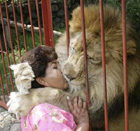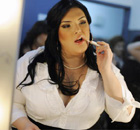In love with luxury
By Rong Jiaojiao (China Daily)
Updated: 2009-12-24 09:25
 |
Large Medium Small |
A KPMG survey in 2007 echoes his findings. More than 70 percent of more than 800 respondents saw luxury brands as a way to demonstrate status and success. More than 60 percent bought luxury goods to reward themselves for hard work and success.
Diana Gu, 37, a freelance writer in Shanghai, admits luxury goods have the benefit of brand recognition and exclusivity.
"The sparkling diamond ring on your finger sends a message that your husband is rich. Sipping cognac indicates you belong to the elite. The designer watch means you are sophisticated," says Gu.
Profiling China's luxury consumers, surveys have shown the majority are aged between 20 and 40 - considerably younger than those in the US and Europe, aged from 40 upwards.
China's super-wealthy, with incomes of $10 million or more, are leading the trend to snatch up high-end items.
A JWT (J Walter Thompson) study in 2007 shows this segment enjoys personalized services and visits luxury shops without concerning itself about prices. To them, buying luxury goods is a demonstration of power, the reflection of knowledge and an understanding of the finest in all things.
The second group of luxury consumers are the new rich, composed mainly of upper-middle management and white-collar workers making $200,000 to 300,000 annually.

The JWT study showed they are often the first generation in their family who can afford luxury products. Their consumption reassures them that new money does not have to be uncouth.
"Although individually they consume less than the super-rich, they contribute most to the hike in China's luxury consumption due to the large size of this group," Li says.
The JWT report suggested super-wealthy and new rich are most likely to indulge their wives or mistresses, and buy business gifts.
Yet the most brand-savvy consumers are the "little emperors" - the generation of only-children born after 1980.
They have a taste for luxury, and money to spend. They are willing to indulge themselves, supported by six sources of disposable income - parents and grandparents - to meet one child's every need.
"The design, the delicate patterns, the distinctive hallmarks of a luxury bag give me pleasure. If I cannot become a celebrity overnight, at least I can buy the bag they use," says 22-year-old Vivian Chen, who wears a pair of Gucci shoes and carries a Chanel bag.
"I hope I can find a good job after graduation, so I can buy luxury gear with my own money," says Chen, whose parents sent her to study in London.
Li Fei is confident that China will become the world's largest luxury market, driven by the continuing pursuit of a better life and the expansion of the middle class as a result of the booming economy.
"It is important to learn how to savor luxury instead of only showing off. Otherwise, consuming luxury is a waste," he says.
In a letter to subscribers this month, Access Asia, a United Kingdom-based independent market research company, said the "secretive market, where hard numbers are problematic and boosterish hoopla PR is the driving force", made forecasting trends difficult.
However, the increasing sophistication of Chinese consumers augured poorly for the "more showy brands such as, notably, Louis Vuitton".
The brand would start to lose sales when consumers mature, Access Asia predicted.
"LV follows boom economies and the new rich. A generation on, a bit of sophistication, and LV becomes a brand people move on from," said the Access Asia newsletter.
Jane Shi spent more than $600 buying a Louis Vuitton wallet, because she "adores its craftsmanship and durability". But in public, she feels a little embarrassed. "I am afraid others might think it a fake," she says.
Meanwhile, China's own luxury brands are still a long way off, says Li.
"Although China enjoys a long history and rich culture with world famous craftsmanship such as embroidery and scented-wood furniture, creative and fashionable brand design, marketing and brand management skills still lag behind."
The Advanced Management Program in Fashion and Luxury at Tsinghua University was launched in 2006 and has since trained 200 people, mainly executives from domestic and overseas fashion firms, in brand management, business models, product strategy, creative design and fashion culture.
"Hopefully, in years to come, the fashion in Paris and Milan will be to wear Chinese silk embroidery, feature ancient Chinese furniture at home and sip Chinese Moutai (liquor)," the professor says.









